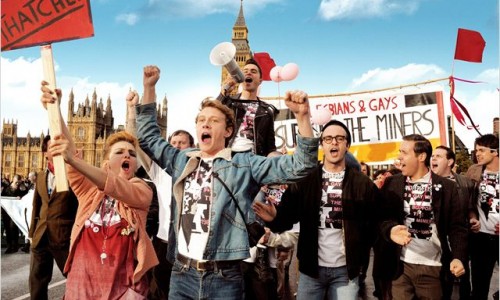BFI bosses have been meeting film producers in London today, to explain its new “Three Ticks” policy that aims to ensure diversity in the British film business. Under the scheme, producers won’t be able to receive funding from Britain’s biggest public film fund unless they meet certain criteria, to increase the representation of women, gay people, ethnic minorities, people with disabilities and people from socially deprived backgrounds, both on and off screen.

The BFI funds about thirty films a year, with more than twenty five million pounds of lottery money. Recent features helped by Britain’s biggest public film funding body include Ken Loach’s Cannes-competitor Jimmy’s Hall, Nick Frost’s Cuban Fury, Jonathan Glazer’s Under The Skin and the upcoming Pride, about a group of gay activists who raised money for striking Welsh miners in the 1980s.
From September, in order to receive BFI Film Fund backing, projects will have to reflect diversity in at least two of three areas — on-screen characters, off-screen crew and in promoting social mobility in the industry. There are a variety of ways in which the boxes can be ticked; on-screen, this could amount to “at least one lead character positively reflecting diversity” or “at least thirty per cent of supporting and background characters positively reflecting diversity,” while off-screen, “key creatives” could be “diverse” or at least two Heads of Department could be from diverse backgrounds.
The head of the BFI Film Fund, Ben Roberts has been meeting members of the producers’ organisation PACT, to explain how the “three ticks” scheme will work, after its initial announcement gave rise to some concerns that it could compromise creativity.
Among the critics, the Conservative MP Philip Davies, who’s on the Commons Culture Committee, told me, “The general public – outside of the bubble of media and film luvvies – are absolute fed up of this kind of political correctness. Decisions should be based on merit and merit alone not on this pathetic kind of box ticking.”
But a BFI spokesman insisted that it was not trying to dictate the kinds of stories it funds and films would still have to pass the same creative threshold, before being put forward to see whether it meets the “three ticks” criteria. The BFI says it hopes to roll the scheme out to other areas of funding, such as development and exhibition.
Rather than simply trying to ensure that across the thirty films it backs, the population of the UK is reflected, the BFI has decided that a commitment to diversity should be shown by every production is supports.
While some groups supporting diversity have complained that the BFI’s requirements don’t go far enough, others – both in the industry and beyond – have expressed concern that films that meet the initial creative threshold might fail to receive two of the three ticks without, for example, shoehorning “diverse” people into the crew, casting a black man as Hitler and a woman as Churchill or by claiming that thirty per cent of the supporting cast or World War Two soldiers just happen to be gay.
Questions have also been asked about whether a public body has any right to know the sexual preferences of Britain’s film-makers. If a gay man fails to receive funding for a project because he doesn’t want to disclose his sexuality, but a gay woman can receive funding simply by virtue of being a woman, this potential discrimination against men could also expand the grey areas.
The BFI responds that the scheme will be flexible and that it’s classification team will help the production teams behind films it wants to back meet the criteria. Certainly, almost any romance would be guaranteed at least one tick, as which romance film doesn’t feature a prominent role for either a woman or a gay man. But if it’s flexible enough that a film that otherwise wouldn’t meet the criteria manages to qualify, perhaps by hiring an intern who hasn’t been to university, then it could undermine its own goals.
The BFI will have a tough balancing act to make the “Three Ticks” scheme ensure that the British film industry better reflects the people who play the lottery – those who provide the money, after all – without compromising creative choices on-screen, manipulating creative teams off-screen or rendering its own guidelines pointless by being too flexible.
